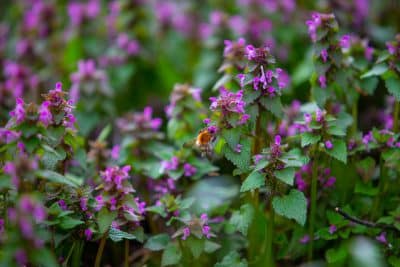Believe it not, fall is the best and most effective time for preventing weeds. During the cooler months, October – December, weeds develop underground and take root in the soil, which makes them more difficult to eliminate by the time they sprout in the spring. Applying a proper weed pre-emergent in the fall drastically reduces the amount of weeds that emerge in the spring, as well as creates a lusher, greener and healthier lawn.
Why Fall Weed Control and Prevention is Important
Fall is the season when tough weeds germinate, or begin to seed in the soil. In order to prevent these seeds from growing, pre-emergent weed treatments must be applied to the lawn. The key to successful pre-emergent weed control is applying the chemicals, to the yard, within a few weeks of the seeds filtering into the soil. Doing this builds a barrier around the seeds and prevents them from growing.
Once weeds begin to take root it becomes significantly more difficult to eliminate them from the lawn. It’s important to note that pre-emergent weed treatments do not kill existing weeds above the soil, but prevent weeds from forming in the first place.
Different Types of Weeds
There’s a handful of weeds that continue growing throughout the winter, including Poa Annua (a.k.a. Annual Bluegrass), Common Chickweed, Purple Deadnettle and Henbit.
- Poa Annua – This is a common, annual grassy weed, that is light green, with leaves that are rough to the touch and can produce hundreds of seeds in the fall. The seeds can remain in the soil for years if left untreated, and it prefers to grow in areas that receive regular water and are shaded. The best way to eliminate Poa Annua is to prevent the seeds from germinating in the soil.
- Common Chickweed – This annual weed is grows along the ground versus growing in height. The seeds germinate in the fall in areas that are damp and shady. Common Chickweed can crowd out existing plants, such as flowers or bushes, if they’re in the same area. The weed actively grows in the fall and spring and is best managed through regular lawn treatments.
- Purple Deadnettle – Another winter annual weed, this one is a late riser, meaning it germinates in the fall and winter, but doesn’t flower until late spring or early summer. The flowers are light purple, with triangular shaped leaves and a square stem. Although Purple Deadnettle can be pulled by hand if there are only a few occurrences, it can quickly get out of hand if the seeds spread. The most effective way to treat this weed is to prevent it from germinating, which is through fall or winter pre-emergent weed applications.
- Henbit – This is a winter, annual weed sprouts during sporadic warm periods in the cooler, winter months. The short warm spells provide just enough heat for seeds to grow before the weather turns cold again, but as soon as consistent warm weather arrives, Henbit will begin growing rapidly. It looks similar to Purple Deadnettle, but is different. Each Henbit plant can produce up to 2,000 seeds, making it a difficult weed to kill. The best way to prevent Henbit is to treat the lawn before the seeds have a chance to germinate and bloom, which is in the fall and winter.
Ongoing Lawn Care
Temperatures in Alabama cool a few weeks slower than our northern friends, giving us a little more time to apply pre-emergent treatments to lawns, but it also means weeds will grow faster and more aggressive than in other climates. Yards that do not receive a pre-emergent application in the fall will have significant weeds by spring. Weeds already growing are tougher to manage than those that are yet to take root. Additionally, weeds will crowd out any healthy grass, making the overall appearance and healthiness of the lawn less attractive and soft.
The first pre-emergent applications usually take place in October, with a second treatment in November and possibly a third treatment in December or January.
Want a Green Lawn in North Alabama and Southern Tennessee Treat for Weeds in the Fall?
Serving North Central Alabama and South Central Tennessee
Limestone County
Ardmore
Home » Want a Green Lawn? Treat for Weeds in the Fall


